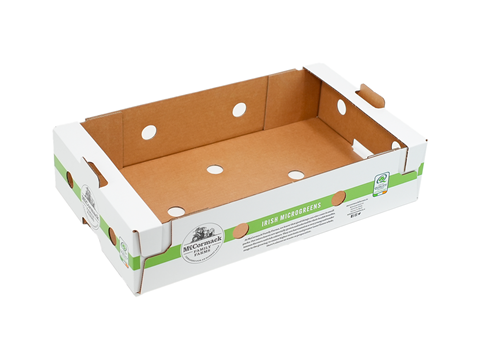
McCormack Family Farms has applied Smurfit Kappa’s water-resistant coating to its cardboard produce trays, replacing wax-lined and PET alternatives in search of recyclability for its packaging.
After discovering the solution via a video posted to LinkedIn, McCormack Family Farms reached out to Smurfit Kappa in hopes of sourcing its packaging locally rather than importing it from Spain. In turn, the transition hoped to reduce the company’s transport costs and carbon footprint, as well as ensure recyclability.
Smurfit Kappa’s Markham Vale site produced the corrugated cardboard pack that is designed to offer resilience and resistance to moisture, thus protecting the contents of the tray. Reportedly, the coating is biodegradable and negates the need for plastic bags, wrappers, or other supplementary packaging that would otherwise be required to preserve the product.
The coating is not thought to impact the recyclability of the cardboard and is post-printed to allow for product branding.
Smurfit Kappa cites consumer research from the National Retail Federation suggesting that 78% of respondents wished for businesses to take more accountability for their environmental impacts and believes that its solution meets this demand. It underlines the availability of its water-resistant coatings for other businesses and packaging applications.
McCormack Family Farms also aims to demonstrate a commitment to sustainable progress, apparently placing orders for two lines for the coated trays after receiving and testing samples.
“Our partnership with Smurfit Kappa Markham Vale has revolutionized our packaging approach,” McCormack Family Farms commented. “Their remarkably robust water-resistant paper packaging solution stands as a testament to innovation that upholds our commitment to sustainability.”
In other news, Notpla’s seaweed-based barrier coating was utilized in collaboration with Coveris to produce takeaway boxes for use at the Erste Bank Open ATP 500 tennis tournament in Vienna.
As Notpla’s seaweed-based packaging only relies on natural polymers found in seaweed to provide its barrier properties, the Dutch Government has named its packaging plastic-free in line with the EU Single-Use Plastics Directive.
Another plant-based coating has been applied to the inside of an all-fibre bottle solution from RyPax and CelluComp; the solution aims to ‘crack the code’ on paper-based bottle packaging.
If you liked this article, you might also enjoy:
The L’Oréal approach to packaging sustainability
The way we talk about plastic needs to change – here’s how to get it right
What steps is Apple taking to make its packaging more sustainable?














No comments yet